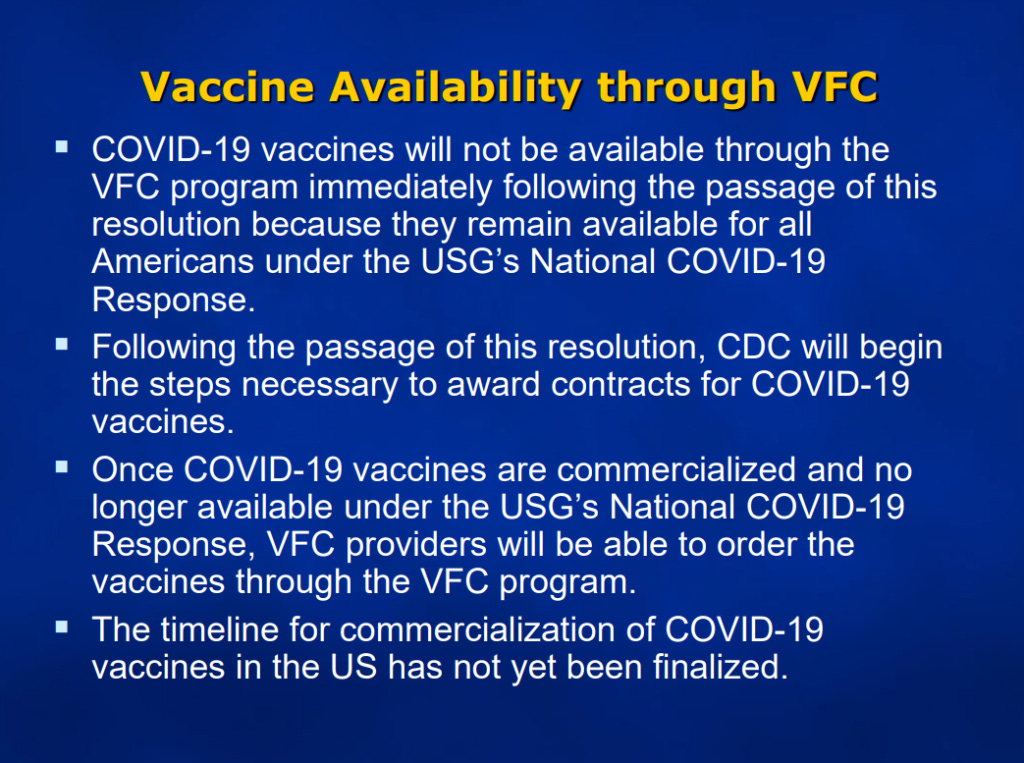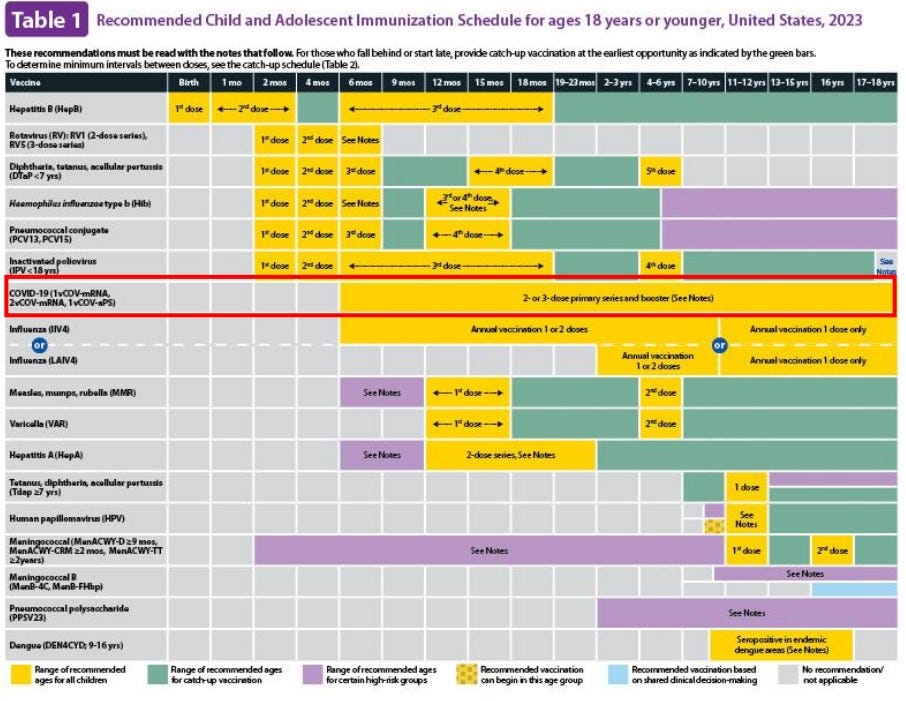ACIP October Meeting & Covid Vaccines for Children
CDC added the Covid vaccine to the childhood vaccine schedule
The debate and drama over this week's ACIP meeting has been a hot mess, but I've done a lot of reading this week and want to share what I know. These are the facts as best I can determine.
The Backstory: How the Confusion Began...
Sometimes on Monday, October 17, Twitter became abuzz with rumors that the ACIP meeting this week would include a vote to add the Covid vaccines to the childhood immunization schedule. Many people honed in on a portion of the agenda on Wednesday that was a vote to add the Covid vaccine to the Vaccines for Children (VFC) program. However, the VFC program is separate from the immunization schedule, so it seemed like it might not be accurate. HOWEVER, the Thursday agenda included a discussion of the 2023 immunization schedule for children/adolescents and for adults. It was still unclear if that meant adding Covid to the schedule or just a regular annual update, but I reached out to some people and Alexander Tin shared this little tidbit with me from a CDC webinar last week, where Sarah Meyer of the CDC said "stay tuned for next week’s ACIP meeting that will be discussed about the COVID-19 vaccines appearing on the child, and adolescent– child, adolescent, and adult schedules." That seemed to confirm the Thursday discussion and vote on the 2023 schedules would include the Covid vaccine. A lot of people still thought the VFC vote was the relevant issue unfortunately, so were expecting a big vote on Wednesday. However, the meaningful vote was Thursday, October 20.
Vaccines For Children Program
Wednesday, Oct. 19, the ACIP saw a presentation about adding the Covid-19 vaccines to the existing Vaccines for Children (VFC) program. This program gives free access to vaccines to families who qualify based on financial hardship. The 15-0 unanimous vote initiated the process to add the Covid vaccines to the program once the vaccines are commercialized (no longer provided free for everyone by the government). Coverage of a vaccine through the VFC seems to be an involved process, so they used this regularly scheduled full meeting of ACIP to get the ball rolling on that. As they explained in the meeting, this program is about giving access to the shots to those who can't afford them in the future, so the discussion and vote was simple and quick, basically, "Should we provide for vaccines for people without insurance or means to pay for them in the future?"

It was widely reported that this was a unanimous vote to add the Covid vaccines to the childhood schedule, but it was not. There was no discussion of age or timing or anything else that would be involved in putting a vaccine on the schedule. They further clarified in the discussion on Thursday that the VFC vote was completely separate and distinct from the schedule.
ACIP Immunization Schedule & School Vaccine Mandates
This is where the real drama around this decision lies. The discussion and vote on updating the 2023 immunization schedules for children/adolescents and adults happened on Thursday. The discussion portion in the morning was fairly brief, and the vote was unanimous in favor of the updates to add the Covid primary series and a booster to the recommendations for everyone 6 months and older (though a booster is not available for children under 5 at this time). The ACIP votes annually at their October meeting to update this schedule, so in one aspect, this was a routine vote for the committee. However, adding the Covid vaccines to the schedule was obviously a more significant update than most years. These vaccines have been very controversial in children, uptake has been low among children under 12, and many of the shots are still under EUA. There was a question about the EUA status, and a CDC representative confirmed that they spoke with legal counsel, who agreed that EUA vaccines could be added to the schedule.
What most people are really concerned about is school mandates. To be clear, it is true that the ACIP sets the immunization schedules, but they do not mandate them - they are recommendations. It is state governments (typically through legislative vote) that determine whether to add vaccines from the ACIP schedule to the state's requirements for school admission. State governments also determine what vaccine exceptions are accepted. Some vaccines are mandated in most/all states, but a couple of vaccines on the schedule, HPV and influenza, are mandated in very few states (and influenza appears to only be required in childcare/preschool settings in those states).
But as we've all learned over the past 2+ years, Covid is highly politicized and many state and local governments, as well as private institutions, have been all too eager to turn CDC recommendations into mandates. Many vaccine mandates are already in place or in progress, so it is expected that adding the Covid vaccine to the ACIP schedule will contribute to additional mandates, and parents in many states are rightly worried that adding the Covid vaccine to the schedule would mean a mandate for their children to attend school. However, there was a lot of inaccurate rhetoric that if the ACIP voted yes to add the Covid vaccines to the schedule, they'd be immediately mandated across the country. This derailed the discussion in unhelpful ways I think, because that was never going to happen and was easy to dispute.
The CDC continues to insist that they are only making recommendations, and have also explained that their recommendations aren't actually changing, because they already recommended the Covid vaccine for everyone 6 months and up, with bivalent boosters when available. And the doctors on the ACIP see themselves as just offering vaccine advice and think of their actions in a vacuum. One ACIP member at least acknowledged that moving it to the official schedule had some "symbolism," but in reality, it's more than just a symbolic change. Many states have laws that specifically cite the "ACIP immunization schedule" for determining school requirements, and it's not uncommon for states to require foster families and children in foster care to be fully vaccinated "in accordance with the ACIP immunization schedule."
As we've seen throughout the Covid pandemic, what continues to happen is that nobody takes responsibility for mandates - for masks, vaccines, distancing, etc. The CDC repeatedly says they just make recommendations, and state/local governments just say they're just following recommendations. Nobody wants to be held accountable for these controversial mandates. I think this is a terrible pattern of passing the buck in public health. But I also think it's important that people understand exactly who is making what decisions in order to advocate effectively. In this case, I think it was always a given that the Covid vaccines would be added to the schedule, so it is more effective to engage with local/state leaders to prevent Covid vaccines from being mandated for school in your state (and vote accordingly).

Liability for Vaccine Manufacturers (EUA, PREP Act, VICP, etc.)
Another issue that comes up related to the ACIP schedule is about how liability is handled for vaccine injuries. For some background, in the US, most vaccines are covered by the National Vaccine Injury Compensation Program (VICP). This was created by the National Childhood Vaccine Injury Act of 1986 to shield manufacturers from liability, so that they would not be discouraged from producing vaccines for fear of lawsuits. The program is funded by a $.75 excise tax on each dose of vaccines recommended for routine administration to children or pregnant women. The vaccines must be commercially sold and taxed in order to qualify for this program and be recommended by the CDC (I believe it has to be on the official schedule, but I'm not certain of the legal language on if the previous recommendation would have qualified.
Currently, the manufacturers of Covid-19 vaccines are protected from liability by the PREP Act until October 2024, which provides coverage for vaccine injury through the Countermeasures Injury Compensation Program (CICP), at least in theory. Few, if any claims have been paid out through that program, and it is more limited than the VICP in terms of what it covers. As far as I can tell, there was no urgent short-term need to add them to the immunization schedule in order to get them covered under the VICP, although that was obviously the long-term plan. The liability protection offered by the PREP Act will continue until October 2024, regardless of any of the following scenarios:
It does NOT matter if the vaccines are under Emergency Use Authorization (EUA) or fully licensed (approved) by the FDA.
It does NOT matter if any public health or national state of emergency declarations are still in effect.
It does NOT matter if the vaccines are commercially sold or provided by the federal government for free.
It does NOT matter if the vaccines are on the ACIP schedule.
On a related note, access to EUA vaccines remains available until the Secretary of HHS ends an emergency declaration under Section 564 of the Federal Food, Drug, and Cosmetic (FD&C) Act. Read more from the Kaiser Family Foundation about what happens when the various Covid emergency declarations end.
FAQs
Aren't vaccines already recommended by CDC for kids 6 months and up?
While the CDC recommends vaccines for children and adults, it's listed as an interim recommendation in the notes on the annual vaccine schedule, not officially part of the recommended schedule.
Can EUA vaccines be added to the schedule?
While it originally seemed that EUA vaccines could not be added to the schedule, the CDC confirmed today that they could add authorized (EUA) or approved (licensed) vaccines to the schedule.
Does the schedule take into account prior infection in lieu of vaccination?
No, the ACIP schedule doesn't mention prior infection for any diseases in lieu of vaccination for any vaccines. Those guidelines are typically part of the state requirements.
Do they present the vaccines as preventing Covid or just protecting from severe disease, hospitalization, and death?
The FDA authorization and approval documents, as well as the CDC recommendations, continue to state that the vaccine is for the prevention of Covid-19 (where Covid is symptomatic disease from SARS-CoV-2 infection). The data on this seems weak and continues to get weaker, but the federal government continues to insist the vaccines prevent Covid.
What versions of the vaccine are fully licensed (approved) for children?
Only the Pfizer vaccine (the original series of 2 shots) is licensed for children 12-17. Pfizer and Moderna are licensed for adults 18+. Bivalent boosters just received their EUA status and are not licensed for any age group.
However, the licensed version, named Comirnaty, is not physically available in the US from what I understand. The FDA says that the Pfizer-BioNTech vaccine has the same formulation as Comirnaty but is "legally distinct." While many doctors and those in public health consider this a distinction with a difference, it's worth noting since Pfizer has had ample time to make it widely available in the US by now.
How can I find out if my state follows the ACIP schedule?
While many states use the ACIP immunization schedule as a framework for their state school requirements, only three states (Hawaii, Rhode Island, and Virginia) and D.C. require the HPV vaccine, which is on the schedule. Look up the laws for your state here. Some states like Florida and Georgia already have laws specifically preventing Covid vaccines from being mandated for public school.
More questions? Reply or message me on Twitter, or contact me through my web site.





